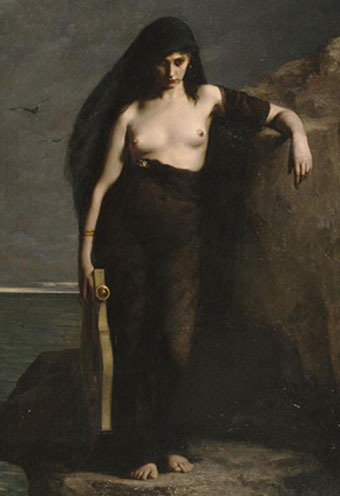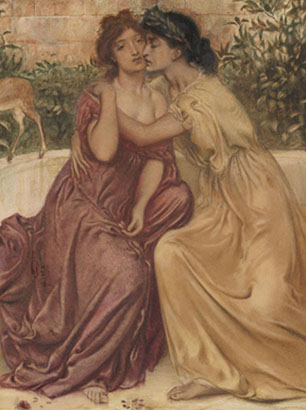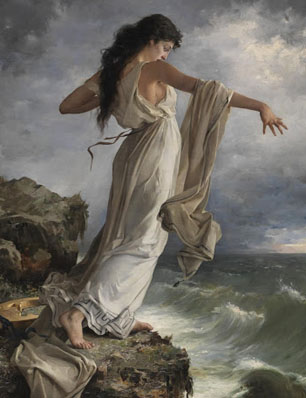Taking time out from current madness to consider one woman’s brilliant writing more than 2500 years ago
Mar 14th, 2019 | By L. Frank Bunting | Category: Entertainment
When relief is needed from Canada’s intermittent bouts of feeling that, to stay relevant in the global village, we must do a bad job of imitating political craziness elsewhere, the editors on this site turn to me. Or so it all too often seems, waiting for the eccentric winter of 2019 to end.
Lately I have myself felt a parallel driving impulse to turn to news of the day on a subject light years away from contemporary politics and economics – anywhere.
I have been inspired in this case by an email ad I received a few days ago from The Folio Society – a UK (English?) publisher with offices at 4 Maguire Street, London SE1 2NQ,on the south side of the Thames River near Tower Bridge. (There is also a Canadian crib of the website, with which the Society prefers you to deal if you live in Canada.)
The ad offers : “If Not, Winter – Fragments of Sappho … Sappho’s complete surviving oeuvre is translated faithfully for the first time, by poet and renowned scholar Anne Carson, in this exquisite new Folio Society letterpress edition … CA$189.00.”
If you really like books – not just as storehouses of information and entertainment, but as sheer physical objects – then you are bound to find the beautifully printed and bound Folio Society editions of classics in various genres attractive.
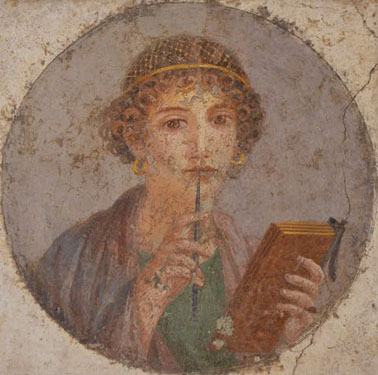
Fresco showing a woman called Sappho holding writing implements, from the Insula Occidentalis in Pompeii (55-79 AD), now on display in the Museo Archeologico Nazionale di Napoli in Italy.
In my own case I already have a few copies of the Society’s arts and crafts. (I have just taken John Reed’s account of the Russian Revolution, Ten Days That Shook the World, down from my shelves, eg. It also has what I see as an excellent once-lost introduction by A.J.P. Taylor.)
In all cases, however, I have inherited my current collection. (Well, I’ve just counted. It’s only three books altogether.) Although I have on various past occasions contemplated buying Folio Society books myself, I have always I think been finally deterred by the equally handsome price charged for these handsome volumes.
Now, with some extra resources inherited along with the books, I am thinking again that maybe I should actually buy “If Not, Winter – Fragments of Sappho … Introduced by Anne Carson … Translated by Anne Carson … Artwork by Jenny Holzer.”
A quick background note on Anne Carson
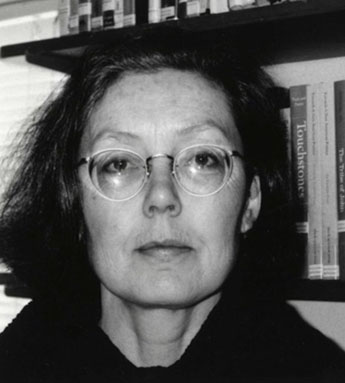
Canadian poet Anne Carson, who has astonishingly won some $700,000 in literary prizes, has also created what many regard as the best present-day translation of Sappho’s ancient poem “fragments” extant.
In pursuit of a decision, I set out to learn a little more about just who Anne Carson is, and whether I might at all like her translation of the surviving fragments of Sappho (c. 630 — c. 570 BCE) – “Archaic Greek poet from the island of Lesbos … known for her lyric poetry, written to be sung while accompanied by a lyre.”
It turns out that Anne Carson (born in 1950 in Toronto, Ontario) is a Canadian poet, essayist, translator, and professor of Classics. She grew up in various parts of Ontario. (Her father worked for a bank, and was frequently transferred.) She was educated in the ancient Greek and Latin classics at the University of Toronto, 1974-1981.
She has subsequently taught classics or otherwise practiced her poetic trade at the likes of (in alphabetical order) the American Academy in Berlin, Cornell University, McGill University, New York University, Princeton University, and the University of Michigan.
She has published more than 20 books. And : “Having won some $700,000 in prizes” Ms Carson “is Canada’s most richly rewarded poet, a status she has achieved by taking poetry out of bounds and into the wild.” (You can also still hear a 2016 CBC Radio interview with Anne Carson on the world wide web today.)
Emily Wilson’s 2004 review of Anne Carson’s original translation of Sappho
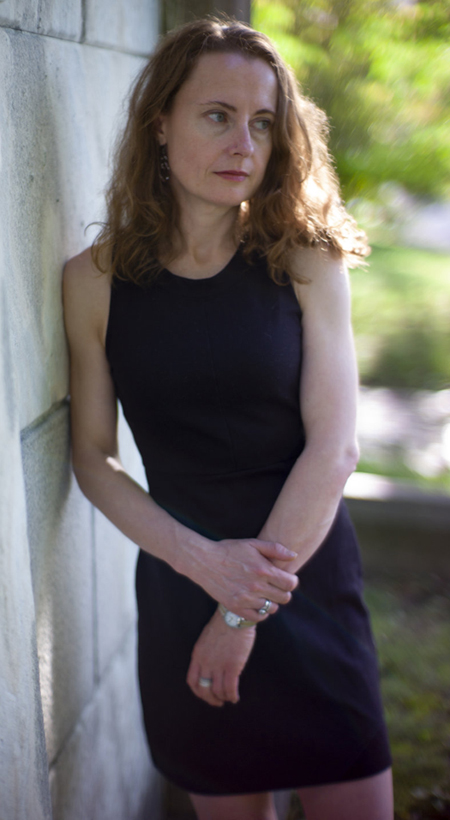
Emily Wilson, professor of Classical Studies and graduate chair of the Program in Comparative Literature & Literary Theory at the University of Pennsylvania. She studied at Oxford University in the UK and Yale University in the USA.
Anne Carson’s If Not, Winter – Fragments of Sappho was originally put into print by Virago – international publisher of books by women, late in 2003. (And this is, as it were, what the Folio Society has republished in one of its beautifully crafted editions in 2019.)
This original edition was reviewed in the London Review of Books early January 2004 by Emily Wilson, who is now professor of Classical Studies and graduate chair of the Program in Comparative Literature & Literary Theory at the University of Pennsylvania.
Ms Wilson clearly admired and even liked Ms Carson’s translations. And she offered a helpful introduction : “Some time around the ninth century, Sappho’s nine books were irrecoverably lost. We have some tantalising scraps, single lines and short quotations, but only one complete poem — the ‘Ode to Aphrodite’ (Fragment 1) … A few longish passages from other poems have been preserved … the most famous is Fragment 31 (‘He seems to me equal to gods’).”
Emily Wilson goes on : “Both scholars and creative writers have made much of Sappho’s fragmentariness. Anne Carson’s new translations, with facing Greek text, make effective use of blank space and brackets to convey the feeling of a torn or burned scrap of papyrus … … Carson provides brief but useful notes which should enable even the Greekless reader to understand some of the most important textual problems in Sappho. Carson tries to translate nothing which is not in the Greek, and to follow the original word order and line breaks as far as possible.”
Anne Carson’s version of Sappho’s Fragment 31
Emily Wilson’s 2004 review reproduces Anne Carson’s masterful translation of Sappho’s famous Fragment 31 in full. And this is what finally persuaded me that I just might like to own the new Folio Society edition of her Virago book of late 2003 :
He seems to me equal to the gods that man
whoever he is who opposite you
sits and listens close
to your sweet speaking
and lovely laughing — oh it
puts the heart in my chest on wings
for when I look at you, even a moment, no speaking
is left in me
no: tongue breaks and thin
fire is racing under skin
and in eyes no sight and drumming
fills ears
and cold sweat holds me and shaking
grips me all, greener than grass
I am and dead — or almost
I seem to me.
But all is to be dared, because even a person of poverty
At this point Ms Wilson returns to tell us : “there the text breaks off. The great thing about this translation is its poverty. Unlike other translators, Carson adds no possessive pronouns or definite articles that are not present in the Greek. Sappho’s speaker can no longer recognise her tongue as ‘my’ tongue; her eyes and ears and skin are no longer her own.”
Ella Haselswerdt’s 2016 article on “Re-Queering Sappho” (with Anne Carson translations)
Finally, in my online adventures on all this I also bumped into a 2016 article by Ella Haselswerdt, who is currently a Postdoctoral Associate at the Cornell University Department of Classics.
This “Re-Queering Sappho” presents a very recent inquiry by a young gay woman into the ancient question of Sappho’s “Lesbianism” – a matter handled in an often amusing and instructive way as well by Emily Wilson’s 2004 review of Anne Carson’s translations, which are also used enthusiastically by Ms. Haselswerdt.
(To clarify that you don’t have to be a gay woman to love Sappho’s surviving fragments, Ms Carson herself currently lives with her second husband Robert Currie, and Ms Wilson “lives in Philadelphia with her three daughters and three cats.”)
I am myself still undecided about whether to actually buy “If Not, Winter … Fragments of Sappho … Translated by Anne Carson” from the Folio Society. But I think I’m closer to Yes!
